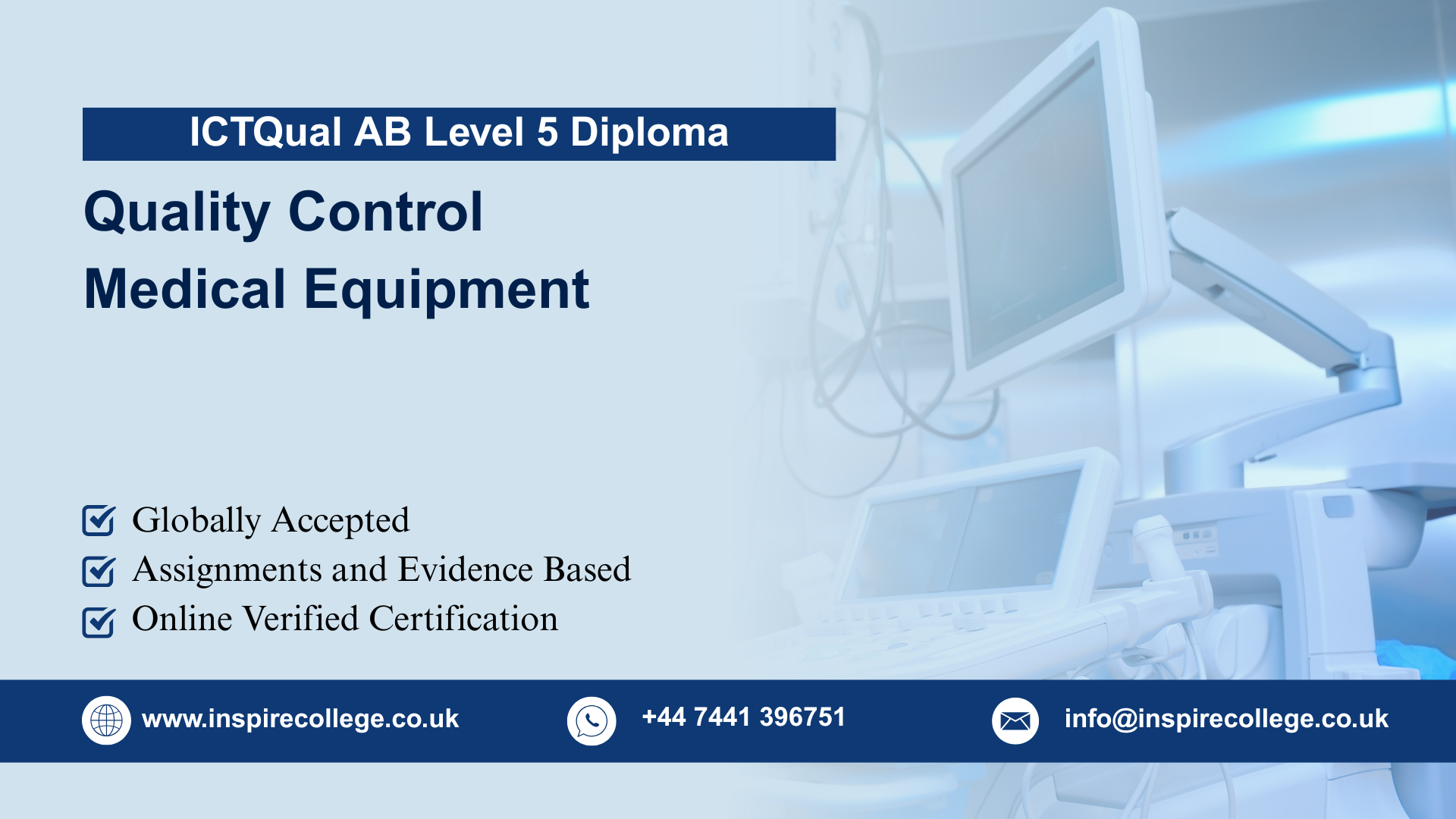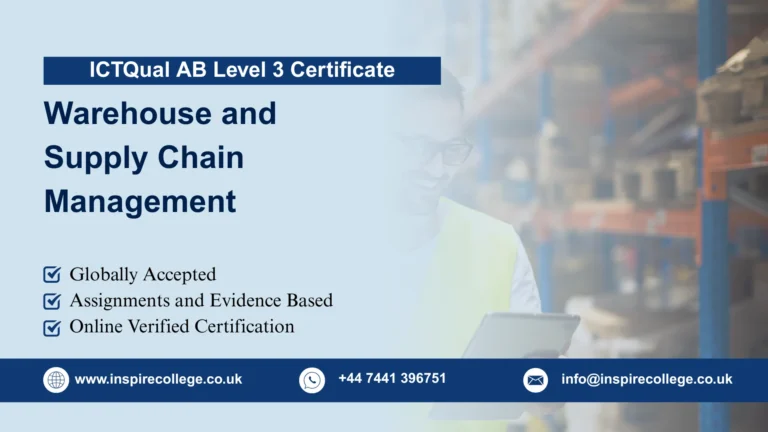
ICTQual AB Level 5 Diploma in Quality Control Medical Equipment
In today’s technologically advanced healthcare environment, ensuring the quality, accuracy, and safety of medical equipment is critical. The ICTQual AB Level 5 Diploma in Quality Control Medical Equipment is an internationally recognized qualification designed to equip professionals with the knowledge, technical skills, and practical understanding required to monitor and maintain the highest standards of medical equipment used in hospitals, clinics, and diagnostic centers.
The ICTQual AB Level 5 Diploma in Quality Control Medical Equipment focuses on the principles, methodologies, and compliance standards essential for evaluating and maintaining medical devices. Learners gain insight into quality assurance protocols, risk management, safety inspections, calibration procedures, and compliance with global regulatory frameworks such as ISO 13485 and FDA standards.
This qualification prepares you to meet industry demands while enhancing patient safety and institutional efficiency through rigorous quality control measures.
The ICTQual AB Level 5 Diploma in Quality Control Medical Equipment is your pathway to a high-impact career in a critical and fast-growing sector. With an increasing reliance on advanced medical technologies, professionals trained in quality control and compliance are in high demand. This diploma equips you with the skills to ensure safety, reliability, and performance across a wide range of medical devices.
Whether you’re looking to enhance your career prospects or contribute meaningfully to patient care and safety, this qualification offers the tools and recognition to get you there.
To ensure learners are suitably prepared for the technical and regulatory demands of the ICTQual AB Level 5 Diploma in Quality Control Medical Equipment, the following entry criteria must be met:
- Minimum Age: Applicants must be 18 years of age or older at the time of enrolment. This age requirement reflects the maturity and responsibility necessary to engage with advanced course material.
- Educational Background: A Level 3 qualification (or equivalent) in a relevant field such as medical technology, healthcare, engineering, or life sciences is required to provide a strong foundation for further study.
- Work Experience (Recommended): While not mandatory, previous experience in a healthcare, biomedical, or technical setting is highly recommended. Such experience supports the practical application of course concepts and enhances learning outcomes.
- English Language Proficiency: As the course is delivered in English, learners must possess adequate proficiency in reading, writing, and understanding technical documents and instructions to engage fully with the course content and complete assessments effectively.
Mandatory Units
This qualification, the ICTQual AB Level 5 Diploma in Quality Control Medical Equipment, consists of 10 mandatory units.
Mandatory Units
- Advanced Principles of Medical Equipment Quality Control
- Biomedical Instrumentation Systems and Calibration Techniques
- Risk Management and Quality Audits in Healthcare Equipment
- International Medical Device Regulations and Standards
- Technical Reporting and Documentation in Medical Equipment QA
- Preventive Maintenance Planning and Equipment Lifecycle Management
- Advanced Diagnostic Testing Methods and Performance Verification
- Root Cause Analysis and Corrective Action in Medical Technology
- Compliance and Ethical Considerations in Healthcare Quality Systems
- Integrated Quality Management Systems (QMS) for Medical Equipment
Learning Outcomes for the Study Units:
Advanced Principles of Medical Equipment Quality Control
• Analyse the advanced concepts of quality control specific to medical equipment
• Evaluate quality systems and their impact on device reliability and patient safety
• Develop and implement quality control protocols in line with organisational needs
• Monitor performance indicators to drive improvements in equipment quality
Biomedical Instrumentation Systems and Calibration Techniques
• Understand the operational principles of complex biomedical instrumentation systems
• Perform precise calibration using industry-standard tools and methods
• Assess the accuracy and sensitivity of diagnostic and therapeutic equipment
• Maintain calibration records in accordance with technical and regulatory requirements
Risk Management and Quality Audits in Healthcare Equipment
• Identify potential risks associated with the use and maintenance of medical devices
• Apply structured approaches to risk assessment and mitigation planning
• Conduct internal quality audits in healthcare technology settings
• Develop audit findings into actionable quality improvement measures
International Medical Device Regulations and Standards
• Interpret key international regulatory frameworks for medical equipment
• Understand the role of regulatory compliance in product approval and market access
• Compare regional and global standards impacting healthcare equipment
• Implement best practices to align quality systems with international expectations
Technical Reporting and Documentation in Medical Equipment QA
• Prepare detailed technical reports for quality control activities and equipment assessments
• Maintain accurate documentation for inspections, failures, and corrective actions
• Understand the importance of traceability and version control in medical documentation
• Comply with internal and external reporting obligations across healthcare environments
Preventive Maintenance Planning and Equipment Lifecycle Management
• Design preventive maintenance schedules based on equipment specifications and usage
• Analyse lifecycle data to optimise asset performance and reliability
• Plan resource allocation for maintenance operations within a quality framework
• Implement tracking systems for equipment history, upgrades, and service records
Advanced Diagnostic Testing Methods and Performance Verification
• Apply advanced diagnostic testing methods to assess medical device performance
• Evaluate device outputs against regulatory and technical benchmarks
• Use specialised tools to conduct performance verification in clinical settings
• Document and interpret test results to support quality assurance outcomes
Root Cause Analysis and Corrective Action in Medical Technology
• Investigate failures and defects using structured root cause analysis techniques
• Develop and implement effective corrective and preventive action plans (CAPA)
• Monitor the impact of corrective actions on equipment quality and reliability
• Integrate root cause findings into continuous improvement initiatives
Compliance and Ethical Considerations in Healthcare Quality Systems
• Understand ethical responsibilities in the handling and reporting of medical device issues
• Ensure quality systems comply with healthcare regulations and professional standards
• Promote a culture of integrity, accountability, and transparency in QA practices
• Identify and resolve ethical dilemmas within quality control environments
Integrated Quality Management Systems (QMS) for Medical Equipment
• Understand the structure and function of integrated QMS in healthcare organisations
• Implement quality policies, procedures, and performance monitoring tools
• Coordinate QMS activities across multiple departments and stakeholders
• Evaluate QMS effectiveness through audits, metrics, and continuous feedback
The ICTQual AB Level 5 Diploma in Quality Control Medical Equipment is ideally suited for individuals seeking to advance their expertise in the quality assurance and technical management of medical devices. This course is designed for:
- Biomedical engineers and technicians who are responsible for the maintenance, inspection, and calibration of medical equipment.
- Quality control and compliance professionals working within healthcare or medical device industries who aim to enhance their understanding of regulatory frameworks and international standards.
- Healthcare professionals and hospital staff involved in equipment safety, asset management, or operational efficiency.
- Graduates of science, engineering, or healthcare disciplines looking to specialise in the technical and regulatory aspects of medical equipment quality control.
- Technical staff from medical equipment suppliers or manufacturers who require in-depth knowledge of equipment standards, testing protocols, and post-market surveillance.
- Professionals seeking career progression into roles such as Quality Assurance Manager, Regulatory Affairs Specialist, or Medical Equipment Auditor.
This qualification is also highly beneficial for those looking to transition into the healthcare technology sector with a focus on safety, compliance, and performance excellence.
Register Now
FAQs for ICTQual AB Level 5 Diploma in Quality Control Medical Equipment






